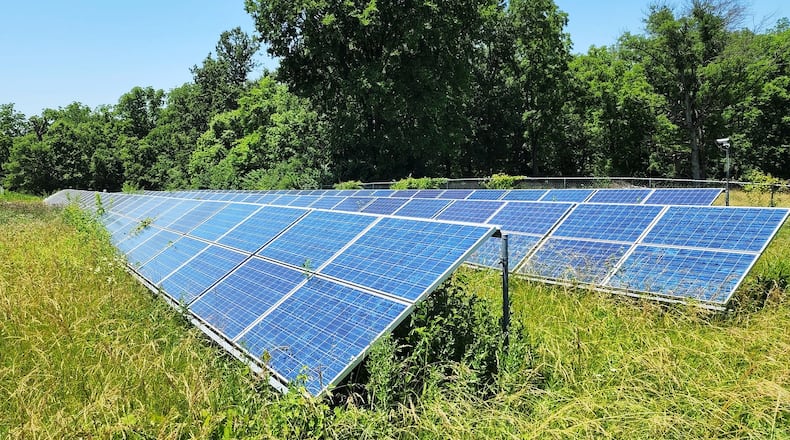Acuff said there doesn’t appear to be a market for wind turbines in this area because gusts aren’t adequate, but solar facilities are a different matter. He said facilities large enough to meet the criteria of the commissioners’ banning authority would have to have the capacity to generate 50 megawatts or more.
Development Director David Fehr put things in perspective further.
“This is generating electricity that’s going to be put on the entire electrical grid system. This is not about a business putting solar panels on their roof to assist with the business,” Fehr said. “Our intent is not to prohibit the people who want to do something on their personal property for their own needs. This is really dealing with these large, mega-scale type facilities that might have an impact on the quality of life of the folks around it.”
Prior to this new legislation power facility locating was the purview of the Ohio Power Siting Board (OPSB), and that entity will still be involved. According to a map on their website there are two solar facilities in pre-construction phase in Preble County and one under construction on the Clermont and Brown County border, but nowhere else near Butler County.
Jon Honeck, senior policy analyst with the County Commissioners Association of Ohio, told the Journal-News he only knows of a handful of counties that have enacted bans or some version thereof. The legislation was introduced to limit the OPSB’s power.
“There was a concern in the legislature about the number of projects that were being proposed and the perceived lack of local input and control over where these things could be sited,” Honeck said. “That’s what gave rise to Senate Bill 52.”
He said the commissioners can either pass a full, countywide ban in the townships or take matters up on a case-by-case basis.
Oxford Twp. Trustee Gary Salmon, who is head of the county township association and on the board of directors for the Ohio Township Association, told the commissioners representatives from the solar industry told the OTA a facility that can generate 50 megawatts would take up 400 acres.
“The solar people also said for them to realize any profit that they need over 100 megawatts or greater in order to be profitable,” Salmon said, because they have a lot of regulatory hoops to jump through and required studies can cost $1 million to $5 million.
In order to pass the regulations, the commissioners were required to hold the public hearing. Those who spoke in favor of the ban said they want the rural character of their townships preserved.
“I don’t think anybody wants a solar facility in their backyard, with an 8 foot, 10 foot high chain link fence around it,” Reily Twp. zoning commission member Rick Schulte said. “I feel there’s better properties, you know the sun shines 300 days a year in Colorado, right? It doesn’t shine that much in Reily Twp. I know a lot of people want to keep it rural.”
Others urged the commissioners not to ban the solar facilities because they are necessary for a sustainable future and leave the decisions to the people who own the land. Rebecca Evans, a farmer from Milford Twp. said with fuel and other prices skyrocketing now is not the time stifle energy producing alternatives and respect farmers’ decisions.
“Farmers are stressed and many of them are barely making ends meet, shouldn’t we allow the farmer to decide how his land parcels are going to be used?” Evans said. “I think we get tired of government regulation no matter how well meaning it is, but the farmer is just trying to make ends meet.”
Margaret Branstrater of Oxford Twp. said the county, schools and farmers can benefit financially by allowing renewable energy leases, but if the commissioners say no, now they might foreclose any chances in the future.
“Once we get the reputation of saying not in my backyard, I don’t want to see this, developers will not even look at Butler County, we get that reputation and we’re never going to get out from under it, nobody is going to propose,” she said. “This is kind of a last, one-shot thing. It’s like turning down a date to the prom and saying the next time you ask me to the prom I’ll say yes — he’s not going to ask again.”
Lydia Skoglind read a letter from the Oxford League of Women Voters asking the commissioners to consider requests as they might come, so they don’t “preemptively take away the rights of landowners to pursue alternative uses for their property.”
“This is not good government practice and is not in traditional government policy-making to ban something before it even exists,” Skoglind said. “In other words the county commissioners, county government should not anticipate what will be proposed before exploring the project details and possible outcomes.”
The commissioners will vote on the measure next week.
Commissioner Don Dixon said he believes a blanket ban is not the best course of action, “just to say there can’t be any anywhere doesn’t make any sense to me, I think there’s got to be some kind of mechanism to go back and do case-by-case on where it is, what it is, all that kind of stuff.”
Commissioner T.C. Rogers said he hasn’t made up his mind but he doesn’t want wind farms and is “reluctant” to approve the solar facilities “but those people made some good points.”
“As a conservative I don’t like to be perceived as limiting a property owner’s rights to do with their property what they want,” he said.
Commissioner Cindy Carpenter said she needs to consult some more township officials and the county prosecutor before making her decision.
About the Author

